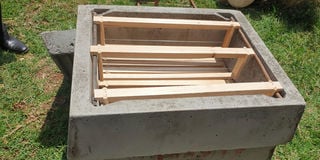State calls for action to protect bee colonies amid climate change

Apiculture Ventures CEO Pauline Otila Kamwara (right) shows some of the company’s products to Director of Livestock Production Bishar Elmi during the 2021 World Bee Day in Kitui.
Stakeholders in the apiculture sector have been urged to work together in order to benefit from initiatives by the government and development organisations as well enjoy economies of scale.
On its part, the government has expressed its readiness to initiate a supportive infrastructure for players in this sector in order to ensure a favourable and enabling policy and taxation environment.
These issues emerged during this year’s World Bee Day in Kitui which brought together various stakeholders in the apiculture industry.
Speaking while officially opening the event, Director of Livestock Production Bishar Elmi called for bold action to protect and conserve bee colonies.

A concrete bee hive which has been developed by The Hive Limited.
Threats
He reiterated that bee colonies are facing threats due to climate change, use of pesticides and deforestation, which has led to reduction in folia for the honey-producing insects.
“I call on all stakeholders from various sectors including public and private sectors to come together so that the industry can thrive,” said Mr Elmi, who was representing Livestock PS Harry Kimtai
This call rhymed with this year’s theme of ‘Bee engaged – Build back better for bees’, which calls for collective action to save the insects.
Although there are different types of pollinators, honey bees account for 80 per cent. They not only play a role in pollinating, but also provide honey and other products such as wax and royal jelly among others.
Food security
Mr Elmi said that bees and environment must be viewed through the lenses of food security.
Although these insects are often associated with honey, pollination accounts for about one in every three bites of food. Bees are responsible for an estimated 80 per cent of pollination.
Kenya produces about 25,000 metric tonnes of honey annually, against a demand of 100,000 metric tonnes, with the gap being bridged by imports from countries like Tanzania.
During the event in Kitui, dealers in honey, apiculture equipment and processed products took the time to showcase various emerging technologies in this sector.
Bee-care Apiaries International for example, displayed their newly invented BeeCare Universal Sustainable Hive (bush) which is a hybrid of the traditional and modern technology.
“This hive is our latest invention and can be converted to langstroth or Kenya top bar hive as per the user’s wish,” explained Mr Onesmus Makau, an exhibitor from Bee-care Apiaries International.

A convertible hive which has been developed by Bee-care Apiaries International.
Concrete hive
Thieves and honey badgers are some of the greatest enemies to bee keepers. In this light, The Hive Limited has invented a concrete hive, which is too heavy for thieves to steal, and cannot be broken into by predators.
Apiculture Ventures showcased various beauty products made from bee products and chocolate with honey among others.
The National Beekeeping Institute showcased products and technologies such as honey, beauty products and apiculture equipment.
Stakeholders were told that there is need to conserve the environment in order to save other pollinators, some which have not been discovered yet.
Apiculture Platform of Kenya (APK) Chairman Stephen Kagio called for collective action in environmental conservation, saying that the number of bee species has been dwindling amid climate change.
Mr Kagio urged stakeholders to come together and actively engage in promoting the apiculture sector as a way of empowerment, wealth and employment creation.
This was the fourth year that APK had spearheaded the organisation of the World Bee Day. This year’s event was organised in partnership with Kitui County government and other stakeholders.
The event was jointly funded by the State Department of Livestock, Trocaire — which is an agency of the Irish Catholic Church — and the National Agricultural and Rural Inclusive Growth Project (NARIGP).






